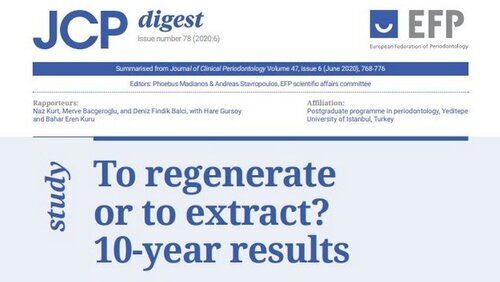![]()
12 October 2020
Periodontal regeneration can be ‘first choice of treatment’ in severe cases
Categories:Clinical Practice, Communication

IN PATIENTS with stage III and IV periodontitis, periodontal regenerative treatment can be used to improve long-term clinical outcomes of severely compromised teeth with deep vertical intrabony lesions. Regenerative therapy has the potential to change the prognosis of periodontally hopeless teeth.
A study, summarised as JCP Digest issue number 78, compared regenerative treatment with extraction and tooth replacement in cases of teeth with hopeless periodontal prognosis in terms of clinical, patient-centred, and economic outcomes over a 10-year period. The potential of regeneration for changing the prognosis of hopeless teeth was also evaluated.
Researchers found that periodontal regeneration is a clinically suitable and less costly alternative to tooth extraction and prosthetic rehabilitation for teeth compromised by extremely severe attachment loss up to or beyond the apex.
Furthermore, they concluded that regenerative periodontal therapy improves the prognosis of hopeless teeth and preserves compromised teeth for the long term, with clinically stable periodontal parameters.
The study suggested that when treating stage III and IV periodontitis patients, periodontal regeneration can be the first choice of treatment for severe cases where the teeth are compromised by deep intrabony defects, as the regenerative approach has economic advantages and patients are likely to prefer tooth retention to extraction and prosthetic rehabilitation.
The research was summarised for JCP Digest by students of the postgraduate programme in periodontology at Yeditepe University of Istanbul in Turkey.




